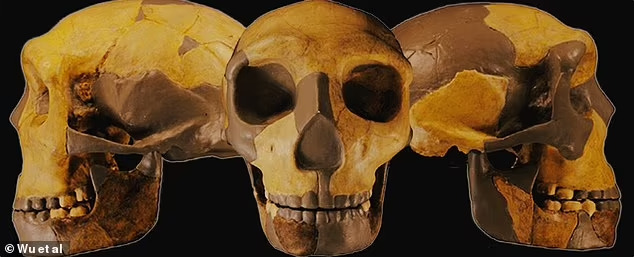Scientists believe they have discovered a new specie of human being after discovering an ancient skull from a youngster who lived up to 300,000 years ago.
In 2019, the fossilized remnants of jaw, cranium, and leg bones were unearthed in Hualongdong, China.
The individual’s facial traits, however, did not match the lineage that split to generate Neanderthals, Denisovans, or humans, leading specialists to think that we might be missing a branch from the human family tree.
Interestingly, the species ‘did not have a genuine chin,’ according to the experts.
This would make it more Denisovan-like, an extinct Asian form of ancient human that split from Neanderthals about 400,000 years ago.
According to scientists at the Chinese Academy of Sciences (CAS), the limbs, skullcap, and jaw of a 12 or 13-year-old youngster appeared to reflect more primitive features.
On the other hand, the remainder of the child’s face resembled current people more closely.
It led the researchers to believe that they had discovered an altogether new lineage of hominins – a hybrid between the branch that brought us modern humans and the one that gave rise to Denisovans in the region.
This would imply that there existed a Homo erectus lineage that led to modern Homo sapiens, a Denisovan lineage, and a third link in the hominin family tree in Asia that was ‘phylogenetically near’ to us.
The discovery is also noteworthy because previous research on Neanderthal remains in Europe and Western Asia discovered evidence of a fourth lineage of hominins living in the Middle to Late Pleistocene.
This missing group, however, has never been officially identified in the fossil record.
Homo sapiens first appeared in China some 120,000 years ago.
However, fresh research suggests that our modern-day’ traits have been present in the East Asian region far earlier than this.
Researchers believe the last common ancestor of Homo sapiens and Neanderthals originated in southwest Asia and dispersed to all continents.
The results of the new study were published in the Journal of Human Evolution.










